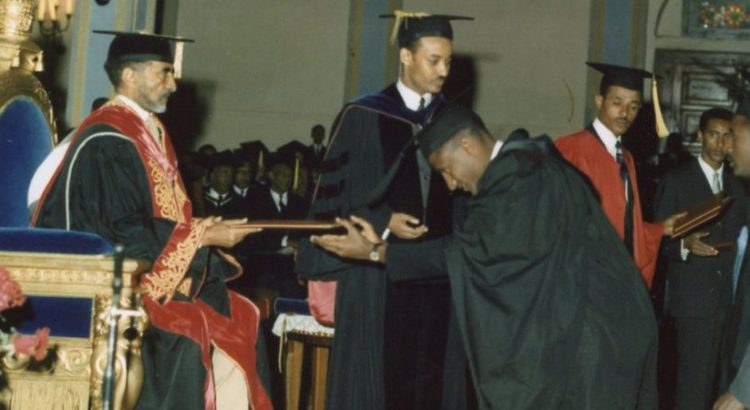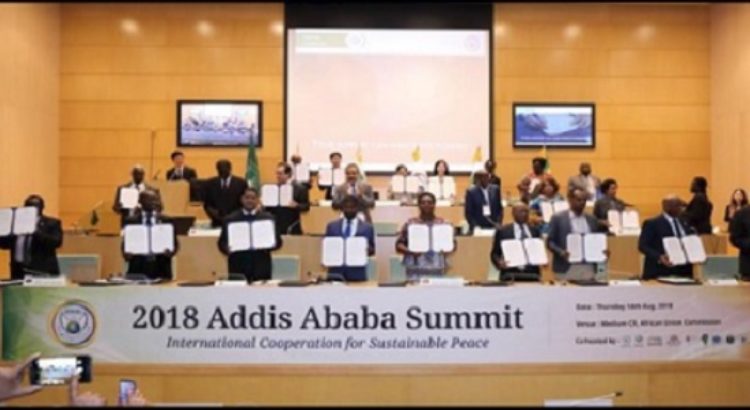By: Kumlachew Fantahun.
As an educationalist with an intimate knowledge of the inner workings of the system, none could be more aware of the aptness or otherwise of the many criticisms levelled at the curriculum’s lack of relevance to the concrete reality of Ethiopian life. Dr. Aklilu readily admits the education inevitably suffered from the inbuilt problems of a curriculum that was imported wholesale and not sufficiently tailored to local needs and concerns, something those who took it upon themselves to closely observe the educational system, Ethiopians and foreigners alike, have never failed to mention. A case in point is an article written by expatriate staff member in an issue of a publication of the university with the title, ‘Know thyself’ in which the author castigates the alien nature of the lessons by pointing out the irony of Ethiopian youth having to study the eating habits of Europeans!
With the defensiveness expected of one among those running the system, Dr. Aklilu points out that tailoring university education, with its metropolitan provenance, to the specificities of developing country with its own needs and context was bound to take considerable time. Stressing the efforts the university administration made to ethiopianise the curriculum, he says, somewhat apologetically, “Establishing a complex system such as a university in an Ethiopian setting, which after all had no prior experience of tertiary education, is a challenging task. In a situation where most of the staff members are expatriates and all the textbooks are imported, I think it would be uncharitable to expect the institution to assume Ethiopian identity overnight.” (p. 323) He then goes on to discuss at length measures taken, often against odds, to ethiopiainize the curriculum, focusing on the training of qualified Ethiopian staff, the launch of the university service program, and the establishment of research institutes.
He devotes an entire chapter (chapter 7) to the university service program, a scheme launched by university administration to familiarise students to the problems and realities of their society. The program required every student to spend one academic year serving local communities before graduation. According to another Ethiopian educationalist, Dr. Mulugeta Wodajo, what forced the university to design the program was the marked tendency of the curriculum to be ’’theoretical and remote from the harsh realities of a poor nation.’’ He adds, “The excessive dependence on foreign teaching materials and foreign textbooks as the medium of instruction further alienates the youth from their social and cultural milieu.”
Tracing the inception of the program to a letter written by a faculty member, Mesfin Woldemariam (later professor), to the president Lij Kassa Woldemariam, Dr. Aklulu discusses the challenges the proposal met before it was accepted. As for himself, he says it was a cause he found close to his heart and one that he enthusiastically embraced and helped promote. The proposal, however, was not greeted by every faculty members. There were other challenges as well; lack of cooperation on the part of receiving organizations, shortage of funds, and student militancy, which he singles out as a major problem that threatened to disrupt the program. As student activism picked momentum, students assigned to teaching in various parts of the country, found it an excellent opportunity to win high school students over to their cause, so much so that the ministry of education found itself increasingly inimical to the idea of having university students teach in the provinces for fear of having younger minds infected with their dangerous ideas. With regard to the goal of opening the eyes of the students to the’’ harsh realities of Ethiopian society’’, it appears the program was quite successful, in fact very much so, contributing as it did, as Professor Bahru Zewde reminds us in his book, The Quest for Socialist Utopia: The Ethiopian Student Movement, C. 1960-1974 (Eastern Africa) “to the radicalization of the students in ways that the university or government authorities had scarcely foreseen.’’(p. 95)
Dr. Aklilu, quite naturally, chooses to limit himself to enumerating the positive outcomes of the program from the perspectives of the authorities and the way it managed to achieve, to a large measure, the goals intended for it. He quotes a study in which 87 percent of the 324 students who completed the program expressed satisfaction at the enlightenment they received as a result of participating in the program. He quotes many statements by the students, to the effect that they returned to the campus armed with better insights into problems of their country and thankful for a richly rewarding experience.
Concerning the training of Ethiopian staff members, Dr. Aklilu mentions, with pride, measures taken to upgrade promising Ethiopian members of staff by sending them abroad for further study. As the scheme was pursued in earnest, considerable gains were made in due course, so that within ten years of its establishment, the university college could boast 62 Ethiopians serving on the staff, out of the total of 182, quite an achievement considering all the instructors were exclusively expatriates initially. After ten years, i.e, 1972-3, their number rose to 308 (56.5 percent of the total).
Another noteworthy development in the Ethiopianization of the curriculum was the establishment of various research institutes, such as the Institute of Ethiopian Studies; Development studies, Science Technology; and Education. In this connection, Prof. Bahru writes, corroborating the idea, of a “conscious attempt to inject Ethiopian material into the curriculum with the number of courses dealing with Ethiopia growing over the years.” Citing as case point “the establishment of what came to be known as the Ethiopian collection in the College Library.. .. [which] eventually became the library of Institute of Ethiopian Studies when it was established in 1963.
The final chapter deals with the thorny issue of the student movement, which the author believes, given its earth-shaking consequences it left in the history of the nation, merits to be studied from every angle, encouraging those who passed through the tumultuous years to give their respective perspectives, citing Hiwot Tefera’s Tower in the Sky as undertaking worthy of emulation.
Naturally Dr. Aklilu is quite unequivocal in his denunciation of the stridency of student militancy for wreaking havoc on the university and for the disruption it caused in the teaching learning process, mincing no words in excoriating what he regards as the excesses and un-called for misadventures of the radicals, particularly the group known as the crocodiles. Interestingly, Professor Paulos tells us in his book cited above that Dr. Aklilu was trusted by the students, including the radicals. Coming from one of the radicals, this testimony seems to testify to the integrity of the person, who it appears, while in no way brooked student subordination, was nevertheless able to earn their trust.
Yet as a loyalist to the monarch whom he almost unqualifiedly reveres, some of his perspectives on the events of the day are bound to be at variance with authors who wrote on the movement, such as Balsvik, Bahru and Paulos.
This comes out clearly in his discussion of the poetry recitals during the College Day which led to the abolishing of the boarding system.
According to Prof. Bahru, the College Day was an event which “generally took place towards the end of the academic year, started in the mid-1950s principally as a day of sport activities. Gradually, however, the poetry contest became its definite feature.”
The poetry recital component which began in 1959, and which the Emperor deigned to grace with his presence and attended by thousands of Addis Ababa residents, increasingly came to be used by the students as opportunity to air their thinly veiled criticism of the regime.
The 1961 poetry recital, with the winning poem Tamiru Feyissa’s, The Poor Man Speaks, proved a turning point in irrevocably turning the already tense relation between the students and the regime for the worse. The reading of the incendiary poem with its depiction of the misery of the poor was not to settle well with the monarch.
Prof. Bahru elaborates, “The emperor was far from amused at what he heard. The unpleasant evocation of poverty by winning poet came to be regarded as a breach of imperial protocol, with fateful consequences for the next College Day and beyond.”
The government retaliated by abolishing the boarding system, giving economic reasons as pretext but in actuality in an attempt to weaken the force of students whose living together in the campus could prove potential threat to the system. They were thus scattered and made to live in the neighborhoods, their protests and grumblings achieving little.
However, after the elapse of some years, the government found itself having to rethink its decision, and eventually restored the boarding system gradually in 1968. The reason, according to Professor Paulos, was because “the decision turned out to be, in the eyes of the regime, counterproductive, since the students who were scattered all over the city started transmitting progressive ideas to the masses among whom they lived. This was much more dangerous.’’
Dr. Aklilu, looking back, admits the decision of the board of the university to be have been ill-thought of, short-sighted, and lacking in a sense of proportion. However, the reasons he gives for the restoration of the boarding system do not, unsurprisingly, tally with those of other writers mentioned above. According to him, what made the university reverse its move was, “the less than wholesome effects living off campus created for the students to, particularly the health and moral harms it exposed them to”, citing unhygienic conditions ,risk of contagious diseases and frequent conflicts with tenants.
As staunch defender of the ancient regime and an ardent admirer of the deposed Emperor, it should not come as a surprise that he should bitterly criticize the student movement for “hurling the nation into turmoil of untold magnitude.” Not all readers are expected to sympathize with the apologetic tone of the book. Yet for those who feel the country would have been better off without militancy of the “ingrate students who bit the hand that fed them,” the book is definitely a welcome treat.
Divergence of views aside, the author should be lauded for chronicling the history of an institution that nurtured him and, whose development, in turn, he took part in shaping, and importantly for writing it in Amharic.
Source of the review: https://www.ethiopiaobserver.com/2018/10/22/documenting-the-expansion-of-tertiary-education-in-ethiopia-part-ii/








 Users Today : 71
Users Today : 71 Total Users : 35460202
Total Users : 35460202 Views Today : 101
Views Today : 101 Total views : 3418884
Total views : 3418884